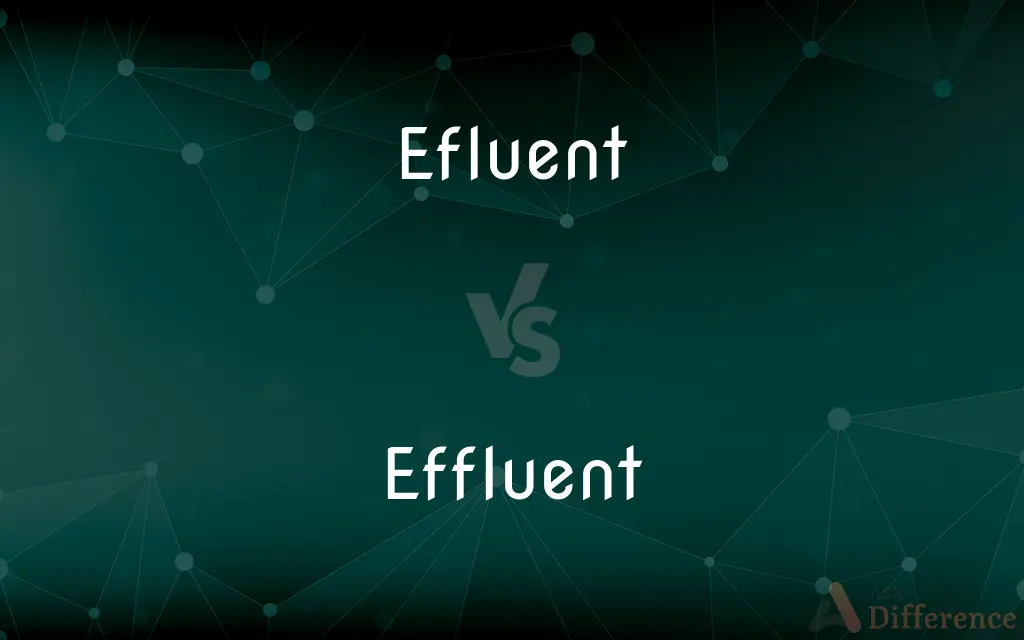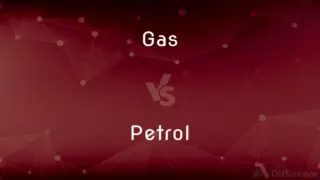Efluent vs. Effluent — What's the Difference?
By Tayyaba Rehman — Published on September 6, 2023
Efluent is an incorrect spelling. Effluent is the correct spelling, referring to liquid waste or sewage discharged into natural water sources.

Difference Between Efluent and Effluent
Table of Contents
ADVERTISEMENT
Key Differences
Recall the prefix "eff-" as in effective to remember it starts with "eff-" and not "ef-".
Associate “effluent” with “efficiency” in cleaning, both start with “eff”.
Remember that "fluent" in English means speaking or writing easily, but "effluent" is about flow, so it needs an extra "e".
Think of the "eff" sound as in "effect" – waste affects the environment, and both begin with "eff".
Memorize: "Effluent is efficient in flowing out."
ADVERTISEMENT
Compare with Definitions
Efluent
Efluent is an incorrect spelling of Effluent.
Effluent
An outflowing of water from a natural body of water, or from a human-made structure.
The lake's effluent provides water to several downstream communities.
Effluent
Treated water sent out from a wastewater treatment plant.
The treated effluent is released back into the ocean.
Effluent
Discharged matter that flows out from any source.
Effluent from the burst pipe caused a minor flood in the street.
Effluent
Liquid waste or sewage discharged from industrial or domestic establishments.
The factory’s effluent flowed into the nearby river.
Effluent
Any outflowing liquid or gas from a particular source.
The plant reduces harmful effluents by using advanced filtration techniques.
Effluent
Flowing out or forth.
Effluent
A stream flowing out of a body of water.
Effluent
An outflow from a sewer or sewage system.
Effluent
A discharge of liquid waste, as from a factory or nuclear plant.
Effluent
Flowing out; outflowing.
Effluent
(countable) A stream that flows out, such as from a lake or reservoir; an outflow; effluence.
Effluent
Sewage water that has been (partially) treated, and is released into a natural body of water; a flow of any liquid waste.
Effluent
Flowing out; as, effluent beams.
Effluent
A stream that flows out of another stream or lake.
Effluent
Water mixed with waste matter
Effluent
That is flowing outward
Common Curiosities
Why is it called Effluent?
It is called effluent because it originates from the Latin word "effluere," meaning "to flow out."
Which vowel is used before Effluent?
Typically, the article "an" would be used before words beginning with a vowel sound, but "effluent" starts with a consonant sound, so "a" is used.
What is the verb form of Effluent?
There isn't a verb form of "effluent." It is primarily a noun.
What is the pronunciation of Effluent?
It is pronounced as /ˈɛfl.u.ənt/.
Which conjunction is used with Effluent?
Any conjunction can be used with "effluent" as with any noun, such as "and" or "but," depending on the sentence structure.
What is the root word of Effluent?
The root word is the Latin "effluere" which means "to flow out."
Which preposition is used with Effluent?
Various prepositions can be used with "effluent," such as "of," "from," and "into," depending on the context.
Is Effluent a negative or positive word?
Context-dependent, but generally neutral. However, in environmental contexts, it can be negative due to pollution concerns.
What is the singular form of Effluent?
The singular form is "effluent."
What is the plural form of Effluent?
The plural form is "effluents."
Which article is used with Effluent?
The article "an" would typically be used before words beginning with a vowel sound, but "effluent" starts with a consonant sound, so "a" is used.
Is the word Effluent is imperative?
No, "effluent" is not an imperative verb form.
Is Effluent a noun or adjective?
"Effluent" is primarily a noun.
Is Effluent a vowel or consonant?
"Effluent" is a word, not a single letter. It contains both vowels and consonants.
Is the Effluent term a metaphor?
By itself, no. But it can be used metaphorically in specific contexts.
Is the word “Effluent” a Direct object or an Indirect object?
"Effluent" can be used as a direct object in a sentence. For example, "The factory processes the effluent."
What is another term for Effluent?
Another term for effluent could be "discharge" or "outflow."
What is the first form of Effluent?
"Effluent" doesn't have verb forms, as it is primarily a noun.
Is Effluent an abstract noun?
No, it's a concrete noun as it refers to a tangible substance.
Is Effluent a collective noun?
No, it's not a collective noun.
What is a stressed syllable in Effluent?
The stressed syllable is the first one, "Eff."
What part of speech is Effluent?
"Effluent" is a noun.
Is Effluent a countable noun?
Yes, you can have one effluent or multiple effluents.
How many syllables are in Effluent?
There are three syllables in "effluent."
Is the word Effluent is Gerund?
No, "effluent" is not a gerund.
Is Effluent an adverb?
No, "effluent" is not an adverb.
How do we divide Effluent into syllables?
Eff-lu-ent
What is the opposite of Effluent?
The opposite could be "influent" which means flowing in.
Which determiner is used with Effluent?
Determiners like "the," "some," "any," or "a" can be used with "effluent."
What is the second form of Effluent?
"Effluent" doesn't have verb forms, as it is primarily a noun.
What is the third form of Effluent?
"Effluent" doesn't have verb forms, as it is primarily a noun.
How is Effluent used in a sentence?
The local factory's effluent is being treated to reduce its environmental impact.
Share Your Discovery

Previous Comparison
Gas vs. Petrol
Next Comparison
Skill vs. TalentAuthor Spotlight
Written by
Tayyaba RehmanTayyaba Rehman is a distinguished writer, currently serving as a primary contributor to askdifference.com. As a researcher in semantics and etymology, Tayyaba's passion for the complexity of languages and their distinctions has found a perfect home on the platform. Tayyaba delves into the intricacies of language, distinguishing between commonly confused words and phrases, thereby providing clarity for readers worldwide.














































